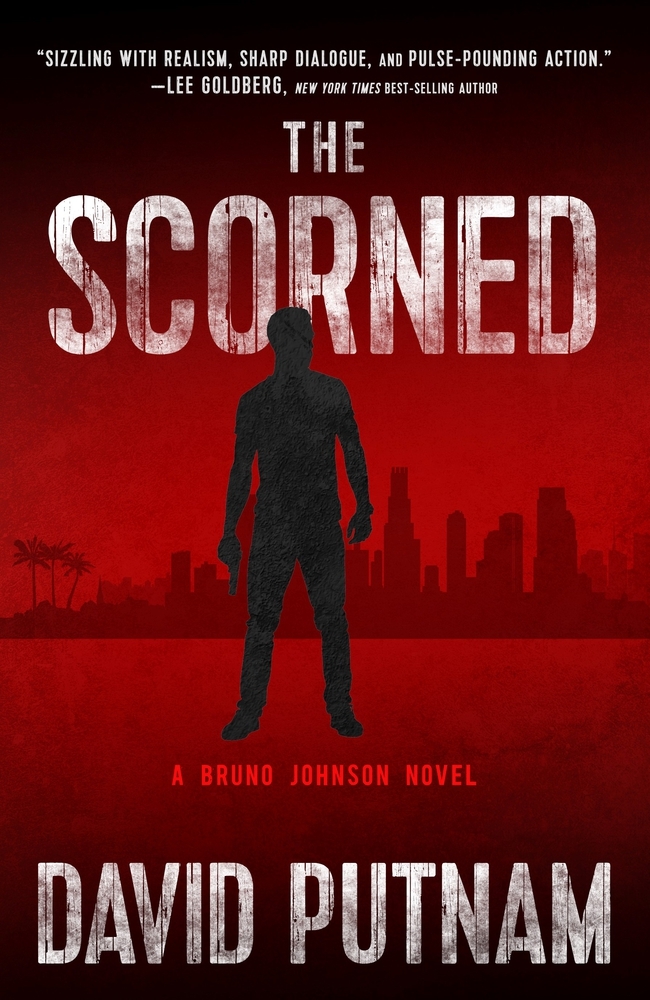
“The Scorned,” the tenth in David Putnam’s Bruno Johnson murder series (rarely is the crime a mystery), is so over the top that it warrants attention because, despite the implausible concentration of so much brutality and violence, Putnam pulls off an engaging first-person narrative. It’s nice at times to be immersed briefly in a wild, action-packed story that’s full of good and bad guys, and know that the good guys will win and be back. Hardly so-called real life.
Bruno, an ex-cop, is hiding out from law enforcement in Costa Rica (don’t ask) with his pregnant wife, Marie (who refers to their unborn child as Alfred E. Newman) and the 10 kids they rescued from dangerous lives in southern Los Angeles. Bruno is Black, though racial conflict has no major part in the plot, which has to do with kidnapping, drugs, gambling, child abuse, gangs and corruption.
Never mind the innocuous title, “The Scorned” — other (equally vague) titles from the series could do as well — “The Disposables,” “The Replacements,” “The Squandered,” “The Vanquished,” “The Innocents,” “The Restless,” “The Heartless,” “The Ruthless,” “The Sinister.” In Bruno’s world, all the nouns find their way in. Bruno lives on the edge, but has a buddy of sorts who has his back, a character who proves to be even more frightening to the underworld than Bruno seems to be, at least to those who realize he isn’t dead. Enter the huge, overweight Karl Drago, whose terror-inducing presence is augmented by his vicious dog, Waldo, a snarling unkempt beast with halitosis who obeys only Drago but tolerates Bruno who talks to him. Waldo eats almost as much as Drago — multiple hamburgers (paper and all) and strawberry milkshakes, and takes his orders in German.
As if these oddballs were not enough, the reader is reintroduced to Bruno’s parents — his adored, advice-giving, dying father who still carries the torch for Bruno’s mother, whom Bruno hasn’t seen for about 40 years because she’s in and out of prison (Bruno is 49). A feisty, shrewd gambler, Mom’s back with a vengeance, courting money, but proves to be a somewhat repentant figure, eventually helping Bruno and Drago get rid of the bad guys. She tools around in a wheelchair which she doesn’t need, and knows how to work the system. Any system. She’s a far cry, however, from the punks and thugs loaded with firearms and bad intent, especially the notorious Johnny F who rules the L.A. crime syndicate, and has duped Layla, a young woman with a baby, who is the daughter of a friend of Bruno’s father back in Costa Rica. And so it begins: “I turned to check behind me for the hundredth time since my bartending shift started — something fugitives do out of instinct.” But Bruno won’t let fear rule his life. He recalls working once with three deputies, two of whom gave up their badges out of fear. “The third one couldn’t do that — instead, he was fitted for a coffin and carried by six of his peers out to a vast lawn to start the beginning of a long dirt nap.”
Layla, it turns out, was a nice university student who met Johnny F in a club on Sunset, one of the Hollywood joints “that rose and fell as often as some people changed their underwear.” To get her back, Bruno gets embroiled in the seedy underworld, including a run in with a nasty under lord with a long beard who doesn’t even know black widow spiders are living in it. Were “The Scorned” ever to find an outlet as a movie, the scenes would go by fast and furious with blood and body parts, vomiting and screaming tortured victims. But also, it would be hoped, with some of the humor Putnam gives Bruno to assure the reader of his humanity.
In an end-of-the-book Author’s Note, Putnam notes that he came from a large but impoverished family that largely lived on welfare, along with whatever his mom could supplement with side jobs that included watching extra children while their parents worked — at times making for 18 kids in the house. Putnam became “the sheepherder and the sheepdog,” helping out. It’s why he relates “so well with Bruno and his mob of children down in Costa Rica,” whom he and Marie saved from poverty and exploitation in the states.
Men certainly are more likely to warm to Bruno’s world than beach-reading women and recognize the authenticity of Putnam’s creds: His previous career was in law enforcement, and he’s seen it all. At one point, he has Bruno musing on being a cop again, missing “the comradery, the brotherhood … the hunt and the satisfaction of coloring within the lines while putting away bad guys.” Well, yeah, but it’s when Bruno goes outside the lines that he becomes memorable.